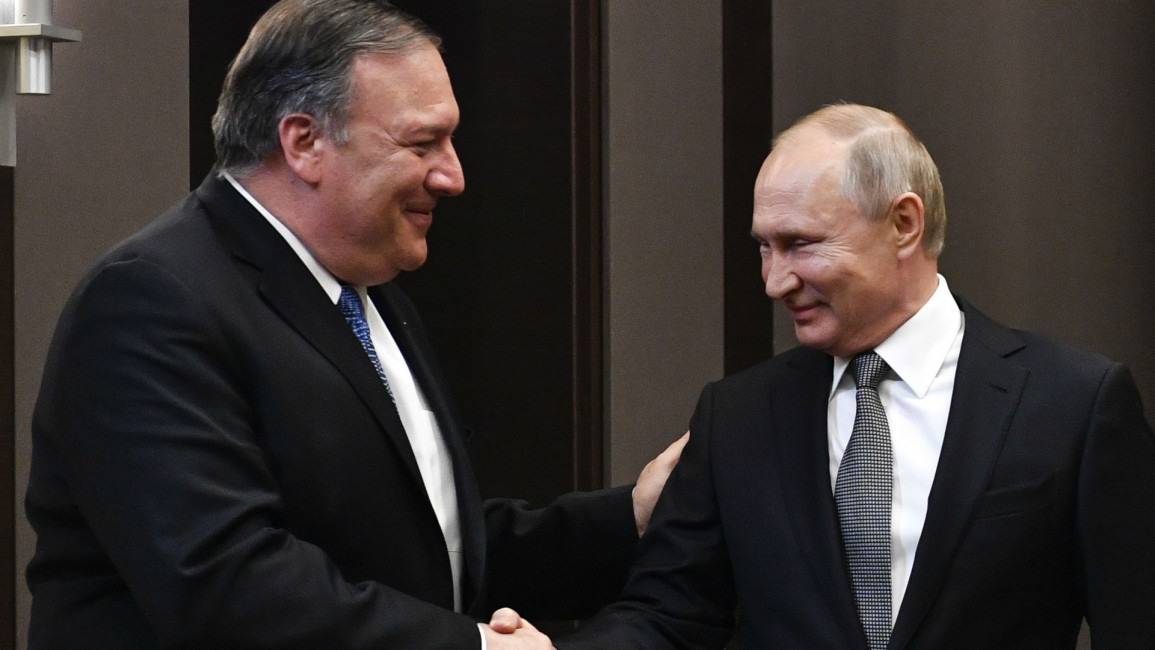Pompeo, Putin 'agree' on Syria progress
The United States and Russia have agreed on ways to break a deadlock in finding a political solution in war-ravaged Syria, Secretary of State Mike Pompeo said after talks with President Vladimir Putin.
Pompeo said that Syria - where the United States and Russia are on opposite sides - was a major topic of conversation during the talks on Tuesday evening at Putin's dacha in the Black Sea resort of Sochi.
He said that the two powers both backed establishing a committee tasked with drafting a post-war Syrian constitution - a key step that has been bogged down by disagreements over its composition.
"We had a very productive conversation on pathways forward in Syria, things we can do together where we have a shared set of interests on how to move the political process forward," Pompeo told reporters at the airport before leaving.
"There is the political process associated with UN Security Council Resolution 2254 that has been hung up and I think we mutually now can begin to work together in a way to unlock that," he said.
He voiced hope to "get that process to at least take the first step of forming that committee".
UN Security Council Resolution 2254, passed unanimously in 2015, called for a UN-backed, Syrian-led political process.
But successive UN envoys working to end the eight-year war, which has killed more than 370,000 people and displaced millions, have struggled to make headway on the constitutional committee.
Pompeo said that Russia and the United States also discussed other areas of cooperation in Syria which he could not reveal in public.
The US pointman on Syria, Jim Jeffrey, was one of the only three US officials to accompany Pompeo in his nearly two-hour meeting with Putin.
Pompeo's visit to Russia - his first as Secretary of State - came as tensions mounted dangerously in the Gulf, with Iran and the US engaged in a war of words over Tehran's nuclear deal with world powers and an alleged attack on four ships in the UAE port of Fujairah.
Iran and the US have blamed each other for the attack.
Pompeo is the highest-ranking US official to see Putin since July 2018, when Trump met him in Helsinki and stunned the US political establishment by appearing to accept the Russian leader's statement that he did not meddle in the US election, contrary to US intelligence evaluations.
The renewed diplomacy between Moscow and Washington follows a long-awaited report by investigator Robert Mueller. He found that Russia interfered in the 2016 election but that there was insufficient evidence to conclude that the Trump campaign colluded with Moscow.
Besides Iran, Washington and Moscow are at loggerheads on an array of urgent strategic questions, including Venezuela, the Syrian conflict and the conflict in Ukraine.
Both the US and Russia hope to make some progress on arms control. Moscow is seeking a five-year extension of the New START treaty, which caps the number of nuclear warheads well below Cold War limits and is set to expire in 2021.
The US president's enthusiasm for courting Putin has little support in Washington, even within his own administration, which has kept up a campaign of pressure on Moscow including sanctions on Russia over alleged election meddling and the country's support for armed separatists in Ukraine.
Pompeo, despite his close relationship with Trump, left little doubt on where he stood in remarks Saturday in California.
Addressing the conservative Claremont Institute, Pompeo said that US policymakers in recent decades had "drifted from realism".
He chastised them for believing that "enfolding the likes of China and Russia into a so-called rules-based international order would hasten their domestic evolution towards democracy".
"We can see now 30 years on, after the end of the Cold War, that the Putin regime slays dissidents in cold blood and invades its neighbours," Pompeo said.
Follow us on Twitter: @The_NewArab



